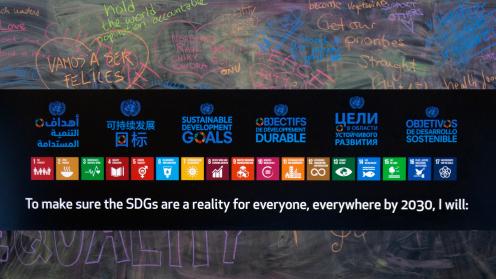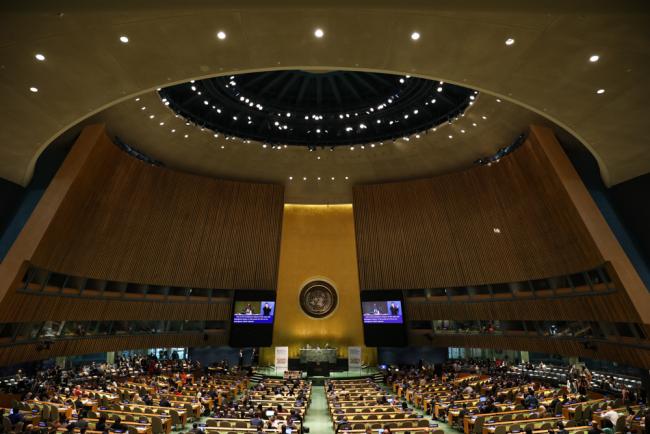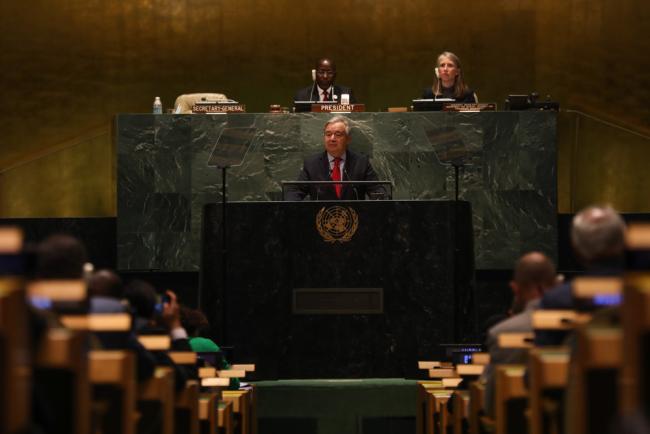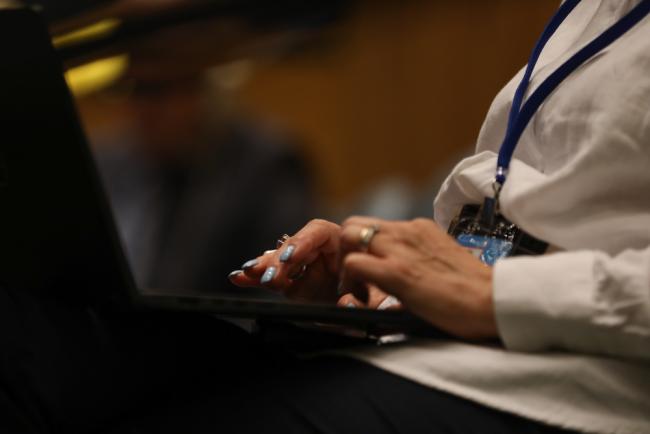The high-level segment of ECOSOC and the ministerial segment of the HLPF opened on Wednesday, 13 July, with statements from leaders of the UN, governments, and youth. ECOSOC President Collen Vixen Kelapile highlighted that, despite the multiple crises we currently face, the 2030 Agenda, Addis Ababa Action Agenda and Paris Agreement provide the blueprint for building back better and achieving sustainable development for all.
Want to dive deeper? Read the full Earth Negotiations Bulletin daily report.
UN Secretary-General António Guterres emphasized that “our world is in deep trouble, and so are the Sustainable Development Goals" (SDGs). He said areas for immediate action include: investing in equitable vaccine access; tackling the food, energy and fertilizer crises; investing in people, including through the Transforming Education Summit; “keeping 1.5°C alive,” including by ending the addiction to fossil fuels and investing in renewable energy; and reviewing access and eligibility for concessional finance for developing countries.
Other leaders highlighted the value of investments in innovation, technology and behavioral change, advancing a Multi-dimensional Vulnerability Index, renewing commitment to Africa’s sustainable development, and accelerating digitalization to create enabling conditions for the private sector. Speakers also called for increased investment in social protection for women and increased and meaningful youth participation in decision making.
Speakers also addressed the contributions of multilateral processes, such as the 26th meeting of the Conference of the Parties (COP) to the UN Framework Convention on Climate Change, the recently concluded UN Ocean Conference, and the upcoming COP 15 of the Convention on Biological Diversity, with calls for governments to keep their commitments.
Eight countries then presented Voluntary National Reviews (VNRs) during the morning and afternoon. El Salvador underscored the government’s work to address security challenges (SDG 16) along with actions to decrease the infant and maternal mortality rate (SDG 3), address food security (SDG 2), and encourage participation in SDG implementation through a digital monitoring platform for SDG indicators.
São Tomé and Príncipe noted a decrease in poverty (SDG 1) and childhood malnutrition (SDG 2), as well as improved literacy rates and class attendance (SDG 4), and gender parity in basic education (SDG 5). However, they acknowledged climate-related challenges (SDG 13) hampering growth in certain sectors including agriculture and mobility.
Somalia noted a decrease in maternal mortality (SDG 3), the revival of the education sector (SDG 4), increased access to clean water and enhancing sanitation (SDG 6), and an increase in internet access towards industrialization (SDG 9). Challenges in this country include a decrease in energy access (SDG 7) and floods, droughts, and locust invasions as a result of climate change (SDG 13).
Dominica said the country is on track to achieve all the SDGs and cited the unfair financial global system as a challenge.
Djibouti outlined actions to achieve SDG 14 (life below water) and SDG 15 (life on land) as well as an 89% school attendance rate (SDG 4) and a reduction of female genital mutilation (SDG 5). He called for investment (SDG 17) to diversify the economy and promote post-pandemic recovery.
Suriname highlighted investment in its education infrastructure (SDG 4) and stressed the challenges of being a highly indebted country (SDG 8). The VNR also notes the country’s plans related to climate action (SDG 13), including its journey to REDD+ Readiness.
Equatorial Guinea highlighted progress on improving equality (SDGs 5 and 10), and its national food security programme (SDG 3). He emphasized a need for further progress on social protection, education, and health, among other issues.
Tuvalu noted challenges related to climate change (SDG 13), a lack of doctors and nurses both generally and during the pandemic (SDG 3), and lack of educational resources and qualified teachers (SDG 4).
All ENB photos are free to use with attribution. For HLPF 2022, please use: Photo by IISD/ENB | Kiara Worth.
To receive free coverage of global environmental events delivered to your inbox, subscribe to the ENB Update newsletter.
Opening of the High-level Segment of ECOSOC / Ministerial Segment of the HLPF

The opening of the high-level segment of ECOSOC and the ministerial segment of HLPF began in the UN General Assembly hall

Youth representatives Khaled Emam, Organizing Partner, Major Group for Children and Youth, and Anja Fortuna, Vice President, European Youth Forum
Voluntary National Reviews

Vince Henderson, Minister for Planning, Economic Development, Climate Resilience, Sustainable Development and Renewable Energy, Dominica

A slide from Suriname's VNR highlights their progress towards SDG 8 - decent work and economic growth

Albert Ramdin, Minister of Foreign Affairs, International Business and International Cooperation, Suriname

A slide from Equatorial Guinea's VNR highlights the structural reforms in place to help achieve their SDG targets












































